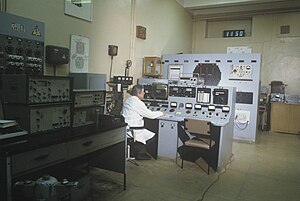The F-1 (from "First Physical Reactor") is a research reactor operated by the Kurchatov Institute in Moscow, Russia. When started on December 25, 1946, it became the first nuclear reactor in Europe to achieve a self-sustaining nuclear chain reaction.[1] It was still in operation in the beginning of the 2010s, with a power level of 24 kW, making it, at that time, the world's oldest operating reactor. The fuel in F-1 is metallic uranium with the natural content of the 235 U isotope (0.72%), graphite as a moderator, and cadmium rods to control the neutron flux. The spherical structure with a diameter of about 6 meters is made of loose graphite bricks. The graphite stack has holes in which fuel and control rods are placed, as well as research and control equipment. The weight of graphite is 400 tons, uranium is 50 tons.
| F-1 | |
|---|---|
 Control panel of the reactor | |
 | |
| Official name | Physics-1 |
| Country | Soviet Union, now Russian Federation |
| Location | Moscow |
| Coordinates | 55°47′46″N 37°28′43″E / 55.79611°N 37.47861°E |
| Status | Permanent Shutdown |
| Construction began | 15 November 1946 |
| Commission date | 26 December 1946 |
| Owners | Russian Research Centre, Kurchatov Institute |
| Operators | Russian Research Centre, Kurchatov Institute |
| Nuclear power station | |
| Reactor type | Graphite Pile |
| Reactor supplier | Russia |
| Thermal power station | |
| Primary fuel | 46,411 kg (102,319 lb) of natural uranium metal |
| Tertiary fuel | 41 kg (90 lb) of 2% enriched uranium |
| Power generation | |
| Capacity factor | 24 kW |
| External links | |
| Commons | Related media on Commons |
Thermal power of the reactor is from 100 W to 1 MW. Air cooling, if necessary, was provided by fans. Long-term operation at high power was not possible, but the large mass of the core allowed a short-term increase in power to peak values.[2] In November 2016 it was in permanent shutdown state.[3]
See also
editReferences
edit- ^ "The World's Oldest Operating Reactor: The Russian F-1". The Nuclear Weapon Archive. Retrieved 25 December 2010.
- ^ Vakhroucheva, Elizaveta. "Division of System Analysis Elektronika Information and Computer Complex Engineering and Production Division". Kurchatov Institute. NTI. Archived from the original on 15 January 2009. Retrieved 25 December 2010.
- ^ "IAEA Research Reactor Database". Retrieved 29 November 2016.
External links
edit- Research Reactor Details - F-1 Nuclear Research Reactors in the World
- Two photos of F-1